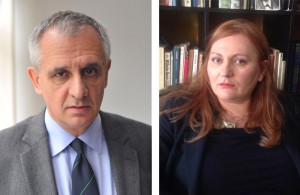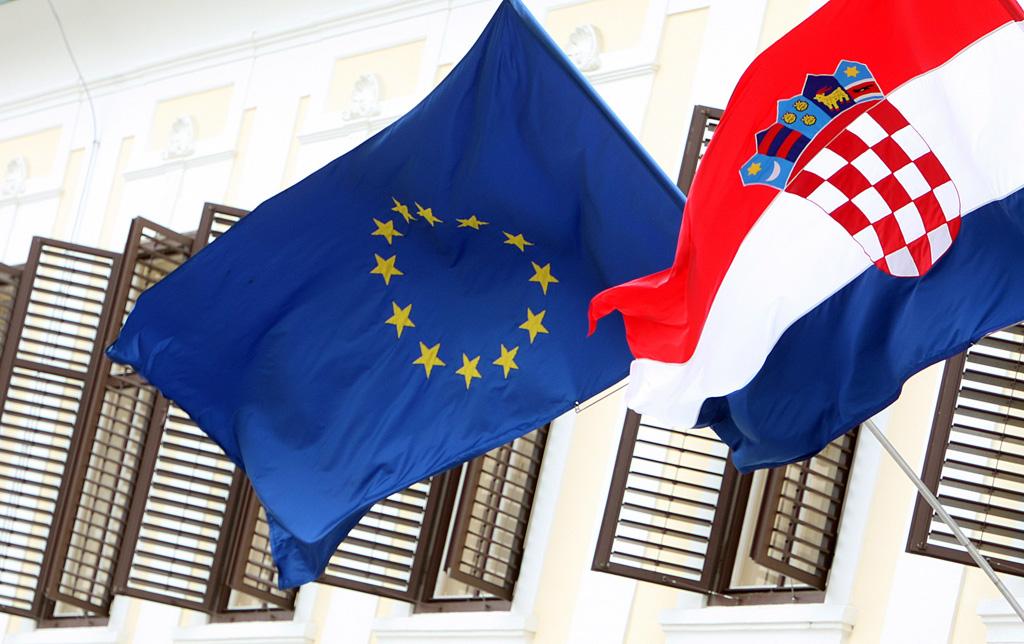 A year after Croatia’s accession to the European Union on July 1, 2013, we asked an academic and a journalist to write their accounts of the much anticipated ‘return to Europe’. Nenad Zakošek and Ines Sabalić argue that while the government has proven to be inefficient, ordinary Croats have started to enjoy the benefits of membership.
A year after Croatia’s accession to the European Union on July 1, 2013, we asked an academic and a journalist to write their accounts of the much anticipated ‘return to Europe’. Nenad Zakošek and Ines Sabalić argue that while the government has proven to be inefficient, ordinary Croats have started to enjoy the benefits of membership.

Nenad Zakošek
The accession of Croatia to the European Union has been an elite driven project ever since the country applied for EU membership in February 2003. The political elites, especially the parties represented in the parliament, formed a kind of “grand coalition” which supported the decision to join the EU and to adopt and implement necessary reforms. Determined opponents of Croatian EU membership were present only on the margins of the political system.
However, an alarming fact was that the majority of citizens failed to express any enthusiasm about Croatia joining the EU. They remained indifferent and sceptical about belonging to the EU. This lack of support prompted the elites to adopt changes of the Constitution in 2010, which cancelled the referendum quorum requirement of more than 50 percent of votes in favour of joining the EU. The fears of the elites were justified: in the February 2012 referendum about EU membership only 43,5 percent of registered voters turned out to vote, with 66,3 percent in favour of EU membership. The lack of enthusiasm was visible also in the subsequent elections to the European Parliament: in April 2013 the turnout was only 20,8 percent and in May 2014 25,2 percent.
Against this political background the balance sheet of the first year of Croatian EU membership is somewhat paradoxical. The political elites, and above all the governing centre-left coalition, failed to capitalize on EU membership in any significant way. They even clashed with the European Commission (EC) on the issue of the European Arrest Warrant. On the eve of accession the government initiated legal changes which were directly in contradiction to the obligations written down in the accession treaty. This provoked a resolute response by the EC, which forced the government to give in. Also in other fields related to the EU the Croatian government did not accomplish much: attempts to tap EU structural funds for projects in Croatia were rather unsuccessful, political activities of Croatian politicians in Brussels didn’t leave a significant mark, and as a consequence of fiscal weakness of its government Croatia had to enter the “Excessive Deficit Procedure” monitored by the EC in 2014.
In contrast to inapt and shaky elites, there are many signs which support the impression that ordinary citizens are getting used to EU membership, inclined to improve their knowledge and skills in order to make the maximum out of it. Seminars and workshops on how to apply for funding from the EU are mushrooming, and indeed a growing number of groups, companies and local communities are participating in application procedures for EU funds. Individuals have become more mobile and prone to look for education and career opportunities in Europe. Some organizations are even profiting from the rules of EU policy-making: recently, the Croatian Employers Association decided to ask for the EC’s protection against a government policy decision which they deemed discriminatory.
As a new member state Croatia has not yet achieved the right mixture of policies which would enable its economy, society and politics to profit from EU membership. But the widespread pragmatism of its citizens is probably an appropriate recipe to reach this goal.
____________________________
Nenad Zakošek is the Dean of the Faculty of Political Sciences at University of Zagreb. He is a regular commentator on Croatian politics in international media.
____________________________
Ines Sabalić
Every country joining the European Union brings its dowry, and Croatia was expected to enhance stability in the region and act as a bridge between the Western Balkans and the Union. The country was expected to prove that work on reforms pays off. But today, the EU has lost its appeal and Croatia fails to convince its neighbours. Serbia, Bosnia and Herzegovina and Montenegro do not perceive Croatia as very different from what it was before, and they are not impressed by its achievements.
In some aspects they are wrong. For instance, the changes in society are mostly positive. Inspite of a surge of occasional repulsive nationalism and populist right – like the referendum banning same-sex marriage or the anti-cyrillic campaign in Vukovar – Croatia did not succumb to its demons when the tight control of its conduct from Brussels was mitigated. In Brussels, Croatia is highly active in Western Balkan advocacy, and the right wing populism is far less pronounced than with many other EU Member States.
One year on, there is a general feeling of greater safety in Croatia and somewhat more opportunities, with one class of Croats – the ambitous ones – being aware of the fact and using it to their advantage. Furthermore, every part of the government administration, including the judiciary, measures itself according to European standards. In its first year in Brussels the government was clumsy in its political moves, seemingly unaware of the complexity of membership of a small country on the fringes of the Union. In one example it stood against the European Arrest Warrant, toying with its credibility, only to comply in the end. Oddly, there is an impression that citizens themselves are more curious to find out about their place in Europe than the governing elite is.
The Croatian economy remains a huge problem. This first year of membership is also the sixth year of recession. Contrary to all other instances of a new member joining the EU, foreign investements in Croatia have decreased considerably. Reforms that could have eased the business climate were not implemented and are significantly late.
The public sector is substantially overgrown, but the private sector is too weak to absorb thousands of people who would have been forced to leave public service as a result of any reforms. Because of the restrictions the EU imposes on new entrants, these people are not allowed to seek jobs elsewhere in Europe. So, the human spillover stays at home, confined into the borders of Croatia just like one year earlier. The government wasn’t prepared well enough to work on EU funds, hence these funds are at least a year late. This is not a fatal delay though. The city of Zagreb, the supposed-to-be engine of Croatian recovery has recently submitted several projects that will be, at least partially, co-financed by Brussels.
It is also worth mentioning that the Europe Croatia joined is not the one it was during the negotiations. Croatia entered not only at the peak of the economic crisis, but also the crisis of values. Instead of making an effort to find a solution beneficial to all, a culture of pointing fingers and stereotyping seems to be dominant in Brussels. The Union’s leader, Germany, is not as subtle as it used to be. It is difficult to reform the Union in such circumstances, not only for the new entrant, but for many other countries too, as shows the British case.
But one should not look at Brussels-based institutions as saviours. If Croatia wants to capitalise on the accession, there is a much of domestic effort to be done.
____________________________
Ines Sabalić is the Representative of the City of Zagreb to Brussels. She is a journalist, Brussels correspondent for Globus, Jutarnji and Vijesti. She is on Twitter @InesSabalic.
____________________________
Note: This article gives the views of the authors, and not the position of LSEE Research on SEE, nor of the London School of Economics.



